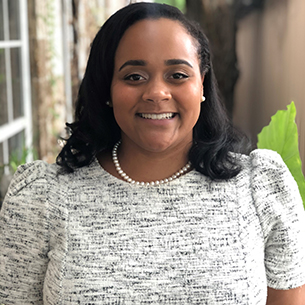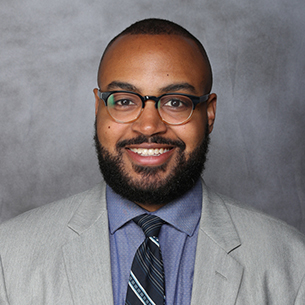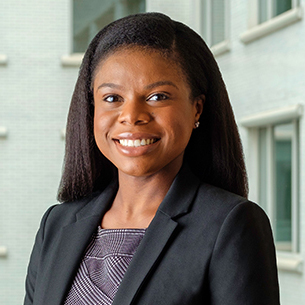Recent TLS graduates: Where are they now?
Landing a job upon graduation is arguably the primary concern of most law students. The last year of law school includes an exhaustive amount of time in job interviews and networking, in preparation for the next step of a law career. We caught up with recent graduates Natalie Paul (L'19), Chris Robinson (L'18) and Kerianne Strachan (L'18) to see where their law careers have taken them.

Natalie Paul (L’19),
Staff attorney at Southeast Louisiana Legal Services (SLLS) in the Child in Need of Care (CINC) Unit
What do you do for SLLS?
I represent children who have been removed from their homes due to neglect and/or abuse. The children I represent are in the custody of the State and are in the foster care system. I work out of SLLS’s Houma Office and primarily practice in Terrebonne Parish and Lafourche Parish.
What is the most rewarding aspect your work?
Seeing a smile on the face of a client when I am able to achieve something they have asked me to do is the most rewarding feeling I have ever experienced. I’m representing the most vulnerable members of our society. As a children’s attorney, I have to advocate for what the child wants. So, although it is not always easy, I know at the end of the day I am making a difference in my client’s life.
How does your Tulane Law degree help you in your work?
My Tulane degree has directly contributed to my success. My job at SLLS is funded by the Lutz Fellowship which is specifically for Tulane Law alums and was founded to benefit child welfare. So I am in the position I am in today because I went to Tulane.
What advice do you have for future Tulane law students of color regarding the law and being a lawyer?
If I could offer any advice, it would be to not give up and to always remind yourself that you deserve to be a lawyer. Remember that grades and ranks do not define who you are or how successful you can potentially be. Becoming a lawyer is not easy, but it also isn’t something that should be easy. It takes a lot of hard work and dedication, but the impact you can make in a client’s life makes it all worth it.
_______________________________________________________________________________________

Chris Robinson (L’18)
Assistant on the Brooklyn Nets Basketball Operations
What do you do for the Brooklyn Nets?
It’s a wide-ranging role, but I utilize my law degree by researching contract and player acquisition precedents.
What is the most rewarding aspect your work?
Basketball has been a life-long passion of mine, so being able to do this day in and day out has been a dream come true.
How does your Tulane Law degree help you in your work ?
It helps me 100%. I came to Tulane for its renowned Sports Law program, with the goal of working in the NBA. Professor Gabe Feldman has helped create a pipeline of Tulane Law students into front offices and Legal Departments across all major sports. I was able to network with Tulane Law alumni already in the NBA, as well as create opportunities on my own given the resources that the Tulane Sports Law program provides.
What advice do you have for future Tulane law students of color regarding the law and being a lawyer?
Do you. Whatever your goal is, big or small, don’t let anybody deter you from reaching it. I had a non-traditional career in law school; I didn’t get straight A’s, but was very involved in Sports Law Society, BLSA, and Moot Court, all of which helped me get to where I am today. Don’t be afraid to walk down the path less taken if you feel it helps get you to where you want to be.
_______________________________________________________________________________________

Kerianne Strachan (L’18)
Associate at Fitch, Even, Tabin & Flannery LLP in Chicago, Illinois.
What do you do for Fitch, Even, Tabin & Flannery?
I focus my practice on domestic and foreign trademark prosecution, clearance, enforcement, and brand protection, as well as copyright law.
What is the most rewarding aspect of your work?
Through my practice, I am able to assist clients with enforcing and protecting their products and services through tasks including, but not limited to, issuing cease and desist letters to unauthorized users of their trademarks and acquiring Federal registrations with the United States Patent and Trademark Office. As our clients have invested a substantial amount of time and resources into the development of their brands, it is rewarding when I am able to contribute to the longevity and success of their companies.
How does your Tulane Law degree help you in your work?
During my time at Tulane Law School, I was able to participate in courses related to my current practice, including Intellectual Property, Trademark & Advertising, Intellectual Property Seminar, and IP & Entrepreneurship. Under the mentorship and instruction of Dr. Elizabeth Townsend Gard, I discovered my passion for trademarks and copyrights and developed my understanding of this area of the law through practical assignments that allowed me to glimpse into the world of intellectual property.
Moreover, I was a member of the Journal of Technology and Intellectual Property which presented various opportunities to not only research relevant and groundbreaking case law, but also to improve my legal writing abilities. This culminated in the publication of my case note, Doe v. Backpage.com: The United States Court of Appeals Further Extends Immunity for Internet Service Providers Under the Communications Decency Act in Volume 19.
My legal research and writing skills have continued to materialize in my role at Fitch Even as I am a regular contributor to the firm's IP Alerts section which features articles discussing updates in intellectual property law. Thus, my experiences at Tulane Law School have certainly provided me with a great wealth of knowledge and skills that have been integral to my success.
What advice do you have for future Tulane law students of color regarding the law and being a lawyer?
To the future Tulane Law School students of color: Dr. Mae Jemison, the first African-American astronaut, once said, "Never be limited by other people’s limited imaginations.” No matter how difficult or impossible the course ahead may seem, do not let any circumstances or the opinions of others dissuade you from pursuing your goals. Take advantage of every opportunity to learn more, increase your network, and build the foundation that you will stand on as you make a difference in this world. Impossible is nothing!
